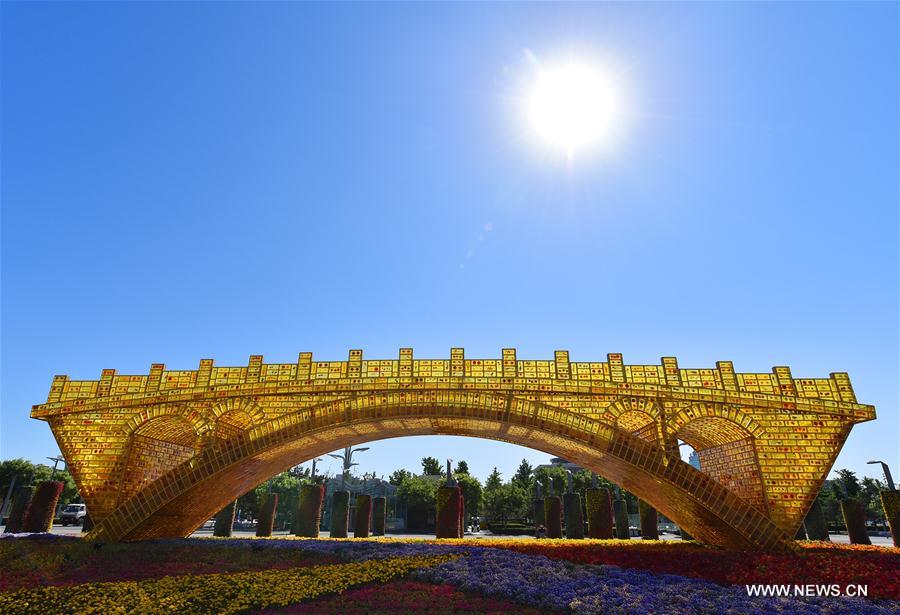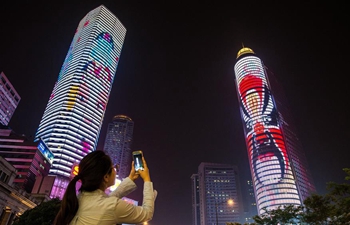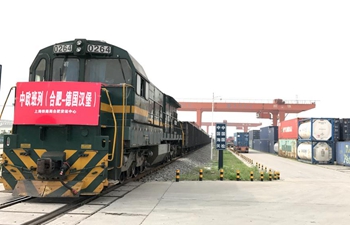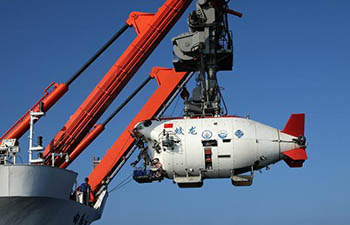
Photo taken on May 13, 2017 shows the "Golden Bridge on Silk Road" structure outside the National Convention Center in Beijing, capital of China. The Belt and Road Forum for International Cooperation will be held here from May 14 to 15. (Xinhua/Li He)
BEIJING, May 13 (Xinhua) -- As the curtain rises on the Belt and Road Forum for International Cooperation and the eyes of the world turn to Beijing, the naysayers circle like buzzards.
There is no shortage of fearmongers ready to throw cold water on the plan. Is the Belt and Road (B&R) really "the most important public goods China has provided to the world" as Chinese Foreign Minister Wang Yi declares, or is it just good old-fashioned Western-style hegemony with Chinese characteristics?
Critics exaggerate fears raised in some countries and choose to highlight the difficulties some projects have encountered. Pessimism sells more newspapers and draws more clicks than stories of success.
At a Senate hearing on global threats Thursday, U.S. national intelligence director Dan Coats identified the Silk Road initiative as "aggressive," as quoted by AP. "They clearly have a strategy," said Coats.
Strategy? Of course. Aggressive? Everyone is entitled to his or her own opinion, but only the fearful see a threat where none is intended.
The hegemony concern is groundless and unnecessary. China opposes hegemony and has said so countless times. China harbors no intention to control or threaten any other nation. China needs no puppet states. China does not indulge in "regime change" either regionally or globally and is not about to begin to do so.
The new Silk Road plan is not and will never be neocolonialism by stealth. Nor will China use the success of the initiative to undermine the influence of others and jeopardize the regional stability upon which the nation's astonishing successes have been built.
Now and in the future, seeking spheres of political influence is not on the agenda of China, which treats all countries, big or small, as equals.China's watchwords in diplomacy are "mutual respect" and "non-inference" in the domestic affairs of other countries.
Focusing on connectivity, the B&R initiative prioritizes infrastructure, the number one requirement of so many countries struggling for development. Industrial cooperation, through extensive consultation, joint contribution and shared benefits, will remain a pipe dream without the infrastructure to transport goods and raw materials, without the power supply to drive production, and without basic improvements to the lives of those people most in need.
The word "initiative" is key. The building of the Silk Road Economic Belt and the 21st Century Maritime Silk Road must be a joint project. This is an open and inclusive plan rather than a selfish strategy to serve China's own interests at the expense of others. "Initiative" means taking the lead; getting the ball rolling. China has kicked off the initiative, and it is now up to others to play the game.
As China assumes its responsibilities as the world's second largest economy, it is only right and proper that the nation should propose sustainable development with others in an era of irreversible globalization.
The new Silk Road plan is all aboveboard. It is exactly what it appears to be: a win-win paradigm for all participants. That's why China earnestly welcomes all countries to join in, to build a community of shared future for mankind. A community of shared future is not just an empty idea, it is a fact of nature. The destinies of nations across the world are intertwined and interdependent. We can all pull together, or we can pull ourselves apart.
Those who hesitate, possibly wary of China's rise, should abandon their qualms and lose no time to share the great opportunity. Join the expanding circle of friends of the initiative. Nepal, the latest country to be welcomed into the fold, inked its cooperation agreement with China on Friday.
The B&R initiative is a fresh and energizing force to fix the world at a time when the world is greatly in need of fixing. The weaknesses and flaws in an old-style global economy are obvious to all as the world struggles to recover from crisis after crisis and meltdown after meltdown. Developing countries have a right to sustainable growth. If they want globalization, then globalization they shall have.
As China rises toward national rejuvenation and its economy undergoes structural changes, the B&R initiative brings enormous potential for cooperation between China and countries along the routes. Growth for one can mean growth for all.
The forum comes at the proper time, a time when fears must be dismissed, when leaders and delegates must build consensus and plan for a shared future.
The Belt and Road forum is not an occasion to assert a new hegemony, but an opportunity to bring an old one to an end.
















